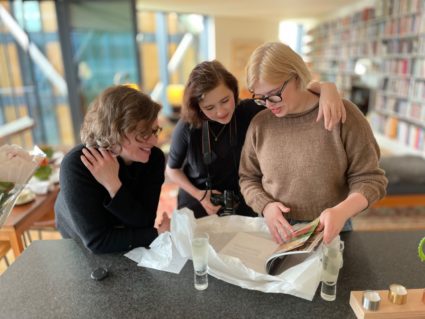anniversaries

My friends and family will tell you that I’m tiresomely addicted to anniversaries. Many of my sentences begin, “Just think, it was only a year ago that…” or “Just think, this time last week we were…” So it is no surprise that I’m thinking today about arriving a month ago at an obscure train station in the wilds of Devon in a spitting drizzle, diving into the unknown for a week of what was billed somewhat dully as “food writing,” but what was ultimately rather a life-changing few days. I wrote, yes, but more importantly I spent a few days learning to give up a certain self-importance about my writing, self-preservation, self-consciousness. It may have been only the group that we were, but we formed an atmosphere where self-expression was de rigeur, dragged out of you rather unwillingly sometimes like a forced confession in a police station, other times exploding almost without will in a story of unexpected significance, but always into a space where that expression was protected and valued. The words were analyzed and valued (or not) for what they were. There was no pretense and very few barriers between us and our work.
It’s intriguing what happens when you find yourself surrounded by other writers. You lose the sort of distance and anonymity you take for granted in other groups of people, people who go through life just living. Writers, even budding writers, go through life observing other people, finding hypothetical relationships among them, hypothetical words to describe them, imaginary situations to put them into. Writers live everything at least twice: once in the living and once in the imagining what sort of story the living would make. It makes no difference that we were all ostensibly writing about food, because as became abundantly clear during the week, to write about food is to write about life. As the great radio presenter and writer Simon Parkes said to us out loud (we had all been thinking it as the days went by), “You can ask people about their politics, about their families, about their lives and they will tell you nothing, but if you ask them about food, you get their observations on all the above.” It’s true. There is an intimacy, an inherent warmth to speaking about food, a conversational trick that sneaks up on you and before you know it, you’ve laid bare your most treasured and, until then, unspoken thoughts and memories.
I suppose if we’d been in Devon writing about crime fiction or screenplays or children’s stories we’d have forged some sort of bond. It’s inevitable when you have no other means of communication: no phone, no television, no newspapers, no computer. You have to bond with someone about something, for *&^%‘s sake (we swore a lot that week). But we weren’t there writing about crime fiction. We were there writing about food, and that meant we wrote about our childhoods, our parents, our travels, our marriages, our children, our lovers. And then to compound the intensity, we read it all out loud to each other and survived the process of reaction: individual words analyzed, rejected, replaced with other words, the whole intimate project on public display.
I miss it. Tomorrow is my once-monthly London writing seminar, a four-hour session with six people I’ve got to know fairly well over the past year or so. It’s at my house and I’m cooking a biryani for lunch. We’ll accomplish something. I’m reading out something I wrote in Devon, and I know there will be a silent dialogue in my head running something like this: “Just think, a month ago…” Thank you, everyone, for an unforgettable experience.
Chicken Biryani
(serves 8)
2 cups basmati rice
5 cardamom pods
5 whole cloves
1 tsp black peppercorns
1 bay leaf
1 stick cinnamon, snapped in half
1/2 tsp salt
1/2 cup oil (not olive, better sunflower)
3 onions, finely sliced
1/2 cup yogurt
3 cloves garlic, minced
1 1/2 tsps grated fresh ginger
4 green chillies, finely chopped
2 lb diced chicken
1/4 cup chopped tomatoes
5 cardamom pods, slightly split
1 tbsp ground cumin
1 tsp garam masala
1 tsp ground cloves
dash freshly ground pepper
2 bay leaves
1 tsp ground cinnamon
2 tsps coriander powder
1 1/2 tsp salt
1/4 tsp ground cinnamon
3 tbsps lemon juice
handful chopped coriander
large pinch saffron, soaked in 4 tbsps warm milk
butter for dotting
Now. I know that looks like a lot. But I’ve divided the ingredients up into the categories in which they’re cooked together. Picture the rice and spices as the potatoes in a moussaka, or the pasta in a lasagne. Then then onions and chicken and such are the meat sauce. And the last bits are the parmesan cheese topping. Trust me.
So steam the rice with all the spices in it, wrapped in cheesecloth or a little empty teabag like they sell at Japanese tea markets. Stop the rice cooking just before it’s finished as it will cook more in the oven. Remove the spices and set the rice aside.
Now brown the onions in a large skillet until quite, quite brown. Save about 2 tbsps on a dish, and put the rest in a large bowl. Combine with the yogurt, garlic, ginger and chillies.
Brown the diced chicken in the onion skillet for about five minutes, and then add the yogurt mixture. Mix well, add all the other ingredients down to the cinnamon and cook VERY VERY low for 30 minutes. The oil will begin to separate. This is good. Remove the bay leaves.
Now you’re ready to layer. Start with a chicken layer, then a rice layer, then chicken, then finish with a rice layer. Spread with the remaining sliced browned onions, then sprinkle the lemon juice over, the coriander, then the saffron-milk mixture. Dot with butter, cover tightly with foil, and bake at 350 degrees for 1 hour.

